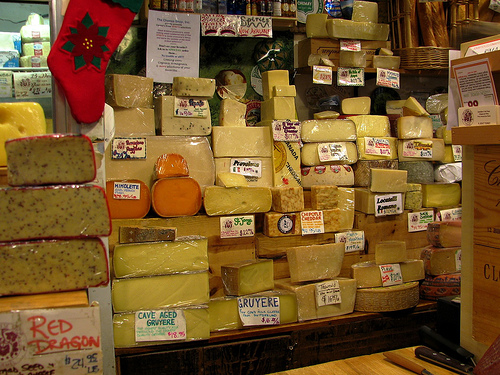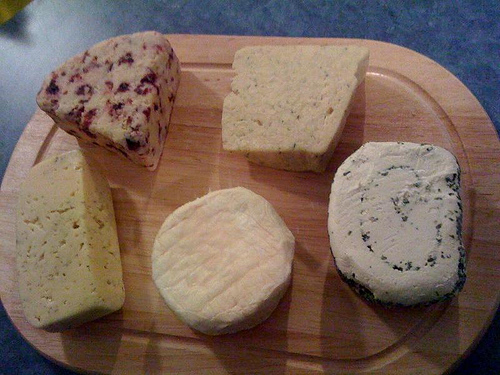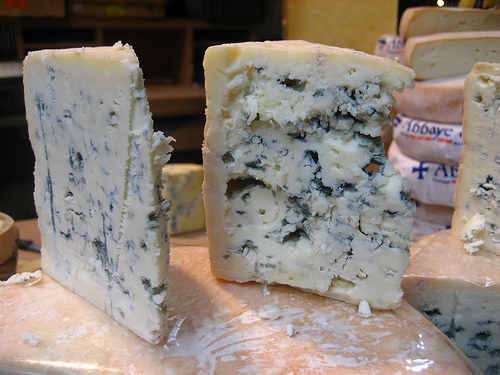Cheese comes in many forms, shapes, sizes and flavours – and as long as it is just in moderation – you can feed all cheeses to your ratty babies as wonderful treats.
Rats do not show signs of being lactose intolerant at low intake levels according to many owners (which cheese would be if fed as a treat) and harder cheeses contain very little anyway for it to be a major health concern.
As long as the cheese you feed your rats (or the cheese your rats steal) is human grade and has been cared for – i.e. you would eat it yourself – then feel free to try a bit out with your rats – just beware that large amounts of certain cheeses can upset anyone’s tummy – so start slow if you haven’t given any cheese before.


Also, be very wary of giving too much sticky or gooey cheese which can get stuck in their mouths – just like peanut butter and such things. Rats can’t always chew them into small enough pieces to swallow safely and they can get caught up in the mouth or throat of the unexpected…
Finally – there is a big difference between things you CAN feed a rat and things you SHOULD feed a rat. Just like us humans the temptation of a fried chicken nugget is sometimes too good to resist.
Anyway back if we can to rats eating cheese….
Cheese originally wasn’t a product – it was a process – I know that sounds a bit strange to most ears – but cheese was and still is made by waiting? Let me explain:
Cheese is the result of a preservation method – it is a way of storing or prolonging the life of milk from cows, goats, sheep or even camel, horses, yaks and reindeer.

Depending on how long you want to store it for, you do different things to it and with it. So preserving milk/making cheese is different for each cheese. The process milk goes through for most cheeses starts the same – but they all end very differently.
So, when you feed fresh un-fermented cheeses to your rats (those which usually have to be kept in the fridge) like cottage cheese and feta – you are still in these early stages of cheese preserving and so the product is still soft – like the whey it is made of. These cheeses are usually still very high in lactose and casein proteins and low in fat and sodium.
These products are also more likely to have ‘extras’ added to them like garlic, nuts, herbs, pineapples, berries and all sorts (think of the Philadelphia or Roule types) so although that makes them taste nicer – just make sure you take these extras into account when you are feeding your rat – i.e. avoiding citrus and mango with your males…


As you move through the cheeses into the semi-soft (including the Camembert and Port-Salut) and semi-hard cheeses (like Cheddar and Swiss) you start to find the lactose percentage reducing but often the sodium (salts*) increasing – as does the flavour – which may well suit some of your critters a lot more.
The most flavoursome and long-lasting cheeses are the hard cheeses (like Parmesan and Gouda) and these are so strong (as all the moisture has gone) that are often only eaten in small amounts rather than the giant slices of Cheddar or double Gloucester put in most farmhouse baps. Certainly don’t go overboard when feeding these hard, mature cheeses to your rats…
*the sodium increases as this is how you actually preserve the milk – making milk last longer. Salt is a great preserver of foods like fish and other meats, just like sugar is a great preserver of soft fruits.
Can Rats Eat Vegetarian And Vegan Cheese?
Absolutely. In the same way as they can eat standard cheeses with animal products in them – they can eat cheeses without animal products in them – HOWEVER – do check the ingredients of these cheeses as they may add other ingredients that are not normally found in regular cheese and could be a bit less rat-friendly. Or they could include ingredients that are non-meat-product supplements – things added for effect rather than nutrition – that you might wish to avoid.
For example many vegetarian and vegan cheeses use nuts, fungi, palm oils, or herbs instead of milk proteins and other thickeners to help them solidify – but there are so many out there that it is hard to write about them all – you just have to read the labels for yourselves.
It doesn’t mean your ratlets can’t have it – just use these extras to judge how frequently these should be given.

And don’t forget that most traditional cheeses are named so, due to strict labelling laws on where and how they are produced like Parmesan (and other products like Champagne) but you can usually buy almost identical products just under another name. So if there is a brand you like that isn’t vegetarian or vegan – doesn’t mean there isn’t an almost identical cheese out there that is…
Can Rats Eat Processed Cheese?
Well, here the ‘can’ and ‘should’ rear their head again – in the sense that most processed foods are undesirable additions to anyone’s diet – so ideally the answer is ‘no’ here.
However, as most humans eat processed and thrive on undesirable foods – why would you deny them to your pets if you had them to hand?
Can Rats Eat Blue Cheese?
There is a lot of repeated information online putting ‘blue cheeses’ on the list of things that rats can’t eat – but they are never accompanied by the reason why.
We are not sure why they don’t do – and many of these articles are found to be referencing other articles which have the same list and the same lack of reason? We am still investigating this reason myself…


Anyway, the blue in blue cheeses, as far as we can make out, is formed by introducing a type of mold (Penicillium) into the air holes in the soon-to-be blue cheese lump. These holes are made by piercing the cheese with stainless steel nails (it used to be copper wires) and then introducing the agent, usually Penicillium roqueforti or Penicillium camemberti into the heart of the cheese (can you see a pattern there).
Then you wait…
We have heard from several rat owners that they have given their rats blue cheeses (usually because they are present in the festive ‘cheese boards’ and the humans of the family don’t eat it themselves!) and have seen no instant or serious side effects that they assumed to be related.
However, you wouldn’t be unwise to follow the general mantra here of ‘if in doubt – leave it out’.
Be safe.